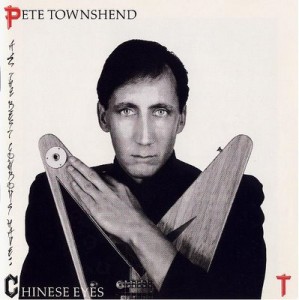
"All The Best Cowboys Have Chinese Eyes" Is My Favorite Solo Record By Pete Townshend. The Album Was Released In 1982, After The Acclaimed "Empty Glass" Had Ignited Townshend's Career.
“All The Best Cowboys Have Chinese Eyes” was issued in the aftermath of Pete’s near-fatal depression of 1980-81. Keith Moon was dead, Kit Lambert was gone, and Pete was not reaching out to the public the way he once did. The faith on his band was broken, he had already launched a promising solo career. His marriage was in shambles (he was living away from his wife and children), and he was a million pounds in debt.
You must understand that Pete was never a strong person. He always had enormous difficulty coming to grips with who he was, and the way others saw him was instrumental to Townshend. When others perceived there was a problem, when they could see behind his blue eyes, that was the time he also noticed that he had a problem. And like most people who face alcoholic issues, he used to go to extremes all the time. He once remarked he even used to get suicidal about people he didn’t know at all if rebuffed.
During this time, virtually everybody scolded him. Roger Daltrey almost had it with Pete one night on stage, and even his best friend Richard Barnes (he who had suggested the name of the band all those years ago) cornered Townshend and called him “pathetic”. Pete’s response? “It’s alright. Why should Keith have all the glory?”
Finally, during a night out at the Club For Heroes he took heroin, overdosed and had to be rushed to ER. It transpired his heart had stopped beating for a while. A mere second later would have been fatal.
The turning point came shortly afterwards when wife Karen asked him “Why don’t you come over again and we try to work it out?”. That gave him the resolve to start pushing once more.
His 1982 record captures all of the above, and it shows that sometimes there is not a difference between being shattered, being broken and being fragmented. The only valid difference lies in being there or not being there at all.
“All The Best Cowboys…” is experimental in every sense. The first track has Pete reciting instead of singing. “Stop Hurting People” is actually an open letter for reconciliation he had written to Karen. The song, dealing with a love that died and had to be born again was the one way to start the record. “People, stop hurting people”, he pleads. And we all can picture him looking into the eyes of his wife as he does so, his gaunt reflection in her eyes, the words “without your love there is no flame” hammering and hammering until they are unleashed into song.
That composition was the one way to set the record spinning. And “The Sea Refuses No River” was the only possible continuation. As you know, Pete loves water. He calls it “the eternal equalizer”. And this song is named after his family’s motto. “The Sea Refuses No River” deals with power and the consequent distortion that it brings about. In the end, Pete sings “The sea refuses no river/and the river is where I am”. A big heart won’t refuse a small one. And that is because a really big heart is only filled to the brim with something small.
The first two tracks evidence the wordiness of the record. You might like that or not. The fact is that it makes the disc noticeable like nothing else within Pete’s oeuvre. And in terms of musical structures, Pete also had a lot to try out now that the time was right for breaking out of himself, and try to see who he was from afar, but (for the first time) through his own eyes. He was not going to base his own perception on other eyes. He was determined to believe in his own vision, once and for all. Music was going to help break the cocoon.
And after the lovely ”Prelude” (a short piano delicatessen in which Pete ends lamenting “why can’t I see a change/before I say goodbye”) Pete comes with the adventuresome “Face Dances Part 2”. Written in an offbeat signature (5/3), the song discusses attractiveness when the heart is beginning to stray a little and the mind is beginning to warp a lot. While it is true that there is beauty in everything, there is also an everything in beauty. We are attracted to things that will hurt us. That is, if we sense a person or a concept will do us no wrong along with the good, then we can’t bring ourselves to love it at all. We can only sympathize with the person or concept. Love implies a latent danger, or something to repudiate at the very least. If that is absent, if there are no hurdles along the way there is no point in setting off. It happens with everything. Even with fame. And if someone has any doubts, the next track (”Exquisitely Bored”) is bound to drive the point home.
Read the second part of this review: the remaining songs on “All The Best Cowboys Have Chinese Eyes” analyzed.

Pingback: Pete Townshend – General Introduction | MusicKO
Pingback: Empty Glass (Pete Townshend) – Album Review | MusicKO
Pingback: All The Best Cowboys Have Chinese Eyes (Pete Townshend) – Album Review (Part 2) | MusicKO
Pingback: Face Dances (The Who) – Album Review (Part 2) | MusicKO